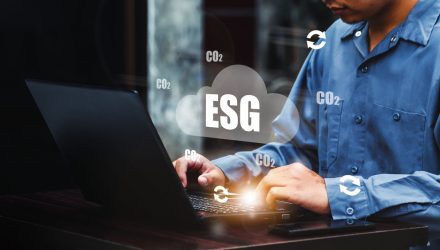There’s no shortage of commentary from Corporate America on environmental, social, and governance (ESG) standards and it is increasingly referenced on earnings conference calls and annual reports.
That’s good news. But there’s much work to be done on the ESG front by American companies and progress to that effect holds implications for exchange traded funds, including the Invesco ESG Nasdaq 100 ETF (QQMG). QQMG focuses on domestic stocks hailing from the Nasdaq-100 Index with strong ESG credentials, though it has some exposure to ex-U.S. equities.
QQMG’s domestic leanings are relevant because, according to the latest edition of the Morningstar Sustainability Atlas, European countries lead the way in terms of sustainability while the U.S. ranks 16 out of 48 countries. That’s decent, but it also leaves much room for improvement.
“On one hand, companies like Apple (AAPL), Nvidia (NVDA), UnitedHealth Group (UNH), and Visa (V) are considered leaders from a sustainability point of view; on the other hand, the ESG Risk Ratings for big names such as Amazon.com (AMZN), Meta (META), and Exxon Mobil (XOM) are classified as high. This is attributable in most cases to the companies’ involvement in controversies,” noted Morningstar analyst Valerio Baselli.
Apple and Nvidia combine for about 20% of QQMG’s roster while Amazon and Facebook parent Meta Platforms combine for 4.27% of the ETF’s portfolio. While the latter two have work to do when it comes to ESG, the good news is the issues are solvable.
Specific to Amazon, the company is already a net-zero leader. Amazon’s ESG risk is largely sourced from the social and governance segments of the acronym as the company has dealt with antitrust suits and allegations of poor treatment of its delivery drivers and warehouse workers in select jurisdictions. Owing to the bad public relations caused by staff-related issues, Amazon likely knows it needs to prioritize working conditions to bolster its ESG credentials.
One area where U.S. firms score well on a broad basis, according to Morningstar Sustainability Atlas, is low carbon risk. It’s a good thing because companies that aren’t making strides in low carbon transition risk harming not only the environment but investor returns as well.
“Yet that transition also means investors must take steps to protect their portfolios from climate risks: Some investments will be disadvantaged in the transition to net zero, while others will find themselves vulnerable to physical risks from extreme events caused by climate change,” added Baselli.
The good news for QQMG investors is that the ETF is loaded with high-growth companies that overtly prioritize carbon-reduction efforts and are spending money to that effect.
For more news, information, and analysis, visit the ETF Education Channel.
The opinions and forecasts expressed herein are solely those of Tom Lydon, and may not actually come to pass. Information on this site should not be used or construed as an offer to sell, a solicitation of an offer to buy, or a recommendation for any product.








